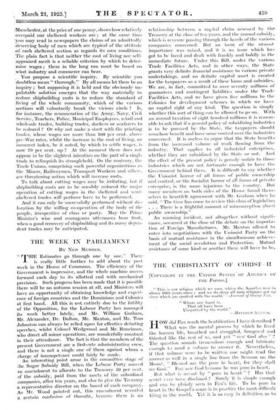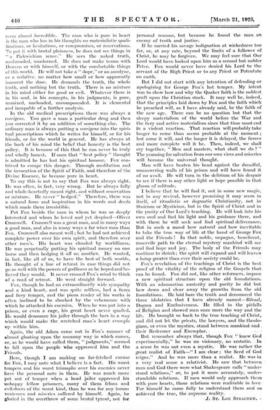• THE CHRISTIANITY OF CHRIST---II
[Corymcirr IX THE 'UNITED STATES or AMERICA BY TIIE Forum.] "This is our religion which we own, whien the Apostles were in above 1600 years since ; and we do deny all vain religions got up Liam which are spotted with the world."---Journal of aeorgo Fox.
" Whose one bond is, That all have been Unspotted by tho world."
--MATTHEW AI1NDLD.
HOW did Fox reach the beatification I have described' What was the mental process by which he lived the human life, breathed and struggled, hungered and thirsted like the rest of us, and yet " sa w God also " ? The question sounds tremendous enough and intricate enough to need a volume to answer it. Nevertheless, if that volume were to be written one might read the answer as well in a single line from the Sermon on the Mount, " Blessed are the pure in heart, for they shall see God." Fox saw God because he was pure in heart.
But what is ;want by " pure in heart " ? Has that secret ever been disclosed ? Surely it is simple enough and can be plainly seen in Fox's life. To be pure in heart in the Gospel's sense is in practice the most difficult thing in the world. Yet it is so easy in definition as to ECM almost incredible. The man who is pure in heart is the man who has in his thoughts no materialistic quali- fications, or hesitations, or compromises, or reservations. To put it with brutal plainness, he does not see things in " a Pickwickian sense." • He sees the naked truth, unshrouded, unadorned. He does not make terms with Heaven or with himself, or with the comfortable things of this world. He will not take a " dope," or an anodyne, or a sedative, no matter how small or how apparently innocent the dose. He demands the truth, the whole truth, and nothing but the truth. There is no mixture in his mind either for good or evil. Whatever there is in his soul, in his concepts, in his judgments, is pure, unmixed, unclouded, uncompounded. It is elemental and incapable of a further analysis.
In the old medical prescriptions there was always a corrigens. You gave a man a particular drug and then you corrected it by an addition of something else. The ordinary man is always putting a corrigens into the spiri- tual prescriptions which he writes for himself, or for his friends, or for the world in general. He has always at the back of his mind the belief that honesty is the best policy. It is because of this that he can never be truly and wholly honest. If once that " best policy " thought is admitted he has lost his spiritual honour. Fox con- trived to escape this danger. Through meditation and the invocation of the Spirit of Faith, and therefore of the Divine Essence, he became pure in heart.
To say this is not to say that Fox was always right. lie was often, in fact, very wrong. But he always fully and whole-heartedly meant right, and without reservation or mixture. He never " hedged." Therefore, there was a natural force and inspiration in his words and deeds which made them irresistible.
Put Fox beside the man in whom he was so deeply interested and whom he loved and yet despised--Oliver Cromwell. Cromwell was a great man, and in many ways a good man, and also in many ways a far wiser man than Fox. Cromwell also meant well ; but he had not achieved complete power over his own spirit, and therefore over other men's. His heart was clouded by worldliness. He was perpetually putting his spiritual money on one horse and then hedging it off on another. He wanted,- in fact, like all of us, to have the best of both worlds. He thought of a line of retreat in case things did not go as well with the powers of godliness as he hoped and be- lieved they would. It never crossed Fox's mind to think of a road of retreat. He went straight forward.
Fox, though he had -an extraordinarily wide sympathy and_ a kind heart, and was quite selfless, had a fierce and fiery temper, and the pious reader of his works is often inclined to be shocked by the vehemence with- which he attacked his enemies. When he was put into a prison, or even a cage, his great heart never quailed. He would denounce his jailer through the bars in a way which would make the wretched man's heart crumple up within him.
Again, the old Adam came out in Fox's manner of almost gloating upon the uncanny way in which curses, or, as he would have called them, " judgments," seemed .to fall upon the people who oppressed him and the Friends.
Here, though I am making no far-fetched excuse- for Fox, I may note what I believe is a fact. His worst tempers and his worst triumphs over his enemies never have the personal note in them. He was much more- put out of temper when a head jailer oppressed his unhappy fellow prisoners, many of them felons and evil-doers of the worst kind, than he was for any incon.! veniences and miseries suffered by himself. Again, he- gloried in the overthrow of some brutal tyrant, not for personal reasons, but because he found the man an enemy of truth and justice.
If he carried his savage indignation at wickedness too far, or, at any rate, beyond the limits of a follower of Christ,• he may be forgiven. We may feel sure that Our' Lord would have looked upon him as a second but nobler Peter. Fox would never have denied his Lord to the servant of the High Priest or to any Priest or Potentate on earth.
But I did not start with any intention of defending or apologizing for George Fox's hot temper. My intent was to show how and why the Quaker faith is the noblest graft upon the Christian stock. It may well be, indeed, that the principles laid down by Fox and the faith which he preached will, as I have already said, be the faith of the new age. There can be no question but that the sleepy materialism of the world before the War and the fiery and active materialism since that time must end in a violent reaction. That reaction will probably take longer to come than seems probable at the moment ; but come it will, and the longer it is delayed, the fiercer and more complete will it be. Then, indeed, we shall cry together, " Men and masters, what shall we do ? " The yearning for salvation from our own vices and miseries- will become the universal thought.
Man will have beaten his head against the dreadful, unanswering walls of his prison and will have found it of no avail. He will turn in the delirium of his despair to see if there is any other light or hope possible in that gloom of solitude.
I believe that he will find it, not in some new magic, not in any revival, however promising it may seem in itself, of ritualistic or dogmatic Christianity, not in- Stoicism or Mysticism, but in the Spirit of Christ and in the purity of Our Lord's teaching. He will look into his- own soul and find his light and his guidance there, and with them he will seek and find spiritual deliverance. But in such a mood how natural and how inevitable to take the true way of life at the hand of George Fox and the Friends ! In that noble, unpagan, beneficent, unservile path to the eternal mystery mankind will see and find hope and joy. The body of the Friends may continue to shrink; the spirit will expand and will leaven a lump greater than ever their society could be.
Fox's revelation of the teachings of Christ is the best proof of the vitality of the religion of the Gospels that can be found. Fox did not, like other reformers, impose a new spiritual structure upon the old foundations. With an adamantine austerity and purity he did but hew down and clear away the growths from the old foundations. He laid bare the truth and denounced the three idolatries that I have already named—Ritual; Dogma and Exclusiveness. He filled in the pitfalls of Religion and showed men once more the way and the life. He brought us back to the true teaching of Christ, and did not let the priests, the lawyers, and the theolo- gians, or even the mystics, stand between mankind and .
their Redeemer and Exemplar. . - But remember always that, though Fox '- knew God experimentally," he was no visionary, no ecstatic. In a sense he was not even a mystic. He was- rather -the ()Teat realist of Faith--," I am- clear ; the Seed of God reigns." And he was more than a realist. He was in a very real sense a relativist. He saw that between • man and God there were what Shakespeare calls " uader stood relations," or, to put it more accurately, under, standable relations. If men would only approach them with pure hearts, those relations were realizable in love For himself he came fully to understand them and so achieved the true, the supreme reality. - - 4: ST. LOE STRACHEY.























































 Previous page
Previous page